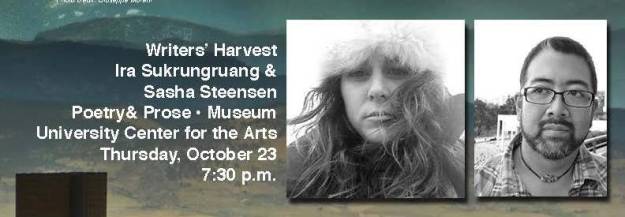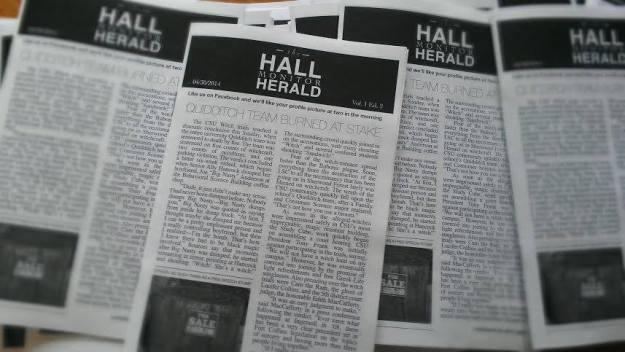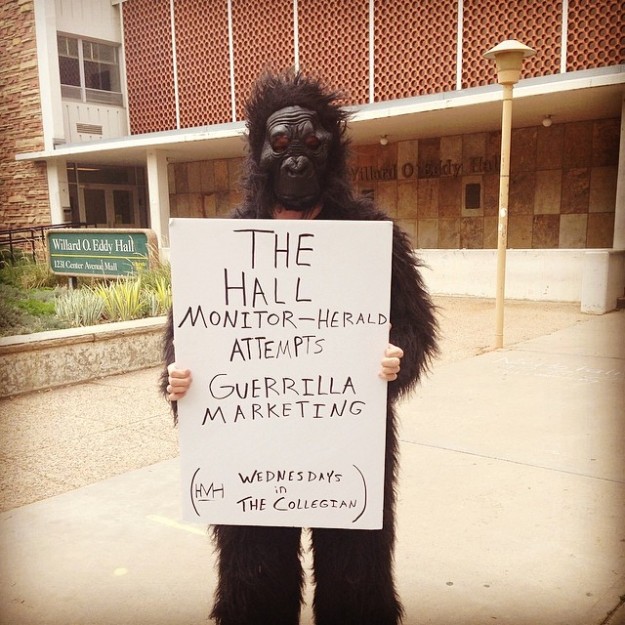
~From Communications Intern Tim Mahoney
This semester, the Creative Writing Reading Series has brought some incredible authors to our campus. Dr. E.J. Levy, director of the series, did an amazing job at bringing a diverse assortment of creative writers, whose specialties ranged from poetry to nonfiction. As the end of the semester approaches, sadly so does the end of this semester’s reading series. One of final readings this semester took place on November 13th, and featured acclaimed nonfiction writer and editor Dinty Moore.
Moore has written several books including The Accidental Buddhist, Toothpick Men, and The Emperor’s Virtual Clothes. Moore is also the editor of the online journal Brevity, which publishes creative nonfiction of 750 words or less. Because of his distinguished career in nonfiction, it was a real benefit to attend the event and hear him read some of his new work.
 The works he chose to read that night all had one thing in common; each essay used humor to approach the extremely profound and personal experiences in his life. His first piece delved into his family’s history as Irish Catholics, in which he used humor to approach his own father’s issues with alcohol. His father’s alcoholism put a lot of strain on his family when Moore was growing up.
The works he chose to read that night all had one thing in common; each essay used humor to approach the extremely profound and personal experiences in his life. His first piece delved into his family’s history as Irish Catholics, in which he used humor to approach his own father’s issues with alcohol. His father’s alcoholism put a lot of strain on his family when Moore was growing up.
Moore explained that his legal name is William Moore, after his father, but has always gone by Dinty, the name of the Irish bartender from the popular comic strip Bringing Up Father from the early 20th century. All of his works were intimate, personal, yet relatable on a human level. I felt the selections he chose to read demonstrated his talent as a nonfiction writer.
After the reading, Moore was asked about the use of comedy in nonfiction: why it is a tool that writers are employing more and more in their writing, and what humor adds to the genre of nonfiction. This question was particularly thought provoking, however Moore answered the question with only a moment’s hesitation. To paraphrase: “humor is an important tool for writers because it allows them approach very difficult subjects. Both writers and audiences benefit from having humor disarm certain situations.”
 Moore provided a good answer. As a nonfiction writer myself, it can be extremely hard to write about the difficult times in life, and using humor gives you some distance from the subject. Hearing Moore explain the nature of his work, and his use of humor, gave me tools to use in my own writing. For me, that is the point of the Creative Writing Reading Series.
Moore provided a good answer. As a nonfiction writer myself, it can be extremely hard to write about the difficult times in life, and using humor gives you some distance from the subject. Hearing Moore explain the nature of his work, and his use of humor, gave me tools to use in my own writing. For me, that is the point of the Creative Writing Reading Series.
Looking back at the different readings this semester, I have a clear picture of the lessons each author passed along. Every author has had different experiences, and each offers their own unique approach to writing. As a student I have found that observing these amazing artists and listening to their work has allowed me to learn from them, and use that knowledge to improve my writing both in academia and beyond.
Next reading in the Creative Writing Reading Series: MFA Students, University Center for the Arts, Museum, Thursday December 4th at 7:30 p.m.
Sponsors of the Reading Series include the English Department and Creative Writing Program at Colorado State University, Organization of Graduate Student Writers through ASCSU, Mike Liggett, Tae Nosaka, and the Poudre River Library District.
All events are free and open to the public. For additional information e-mail andrewnmangan@gmail.com. For a full listing of 2014-2015 Creative Writing Reading series events, please visit: http://english.colostate.edu/docs/reading-series-poster.pdf




















